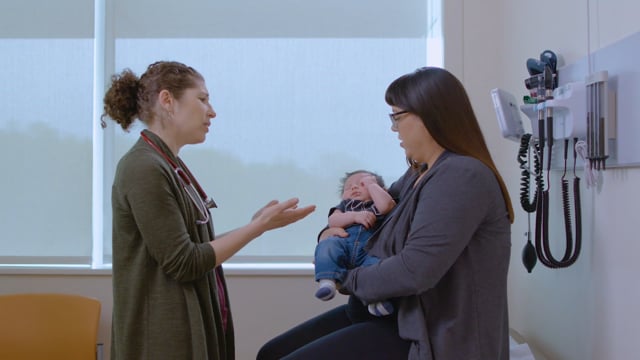- Home
- Humana Medicaid
- Kentucky Medicaid
- Medicaid extras
- Health and wellness
- Parents Home
- Para Padres
- A to Z Dictionary
- Allergy Center
- Asthma
- Cancer
- Diabetes
- Diseases & Conditions
- Doctors & Hospitals
- Emotions & Behavior
- First Aid & Safety
- Flu (Influenza)
- Food Allergies
- General Health
- Growth & Development
- Heart Health & Conditions
- Homework Help Center
- Infections
- Newborn Care
- Nutrition & Fitness
- Play & Learn
- Pregnancy Center
- Preventing Premature Birth
- Q&A
- School & Family Life
- Sports Medicine
- Teens Home
- Para Adolescentes
- Asthma
- Be Your Best Self
- Body & Skin Care
- Cancer
- Diabetes
- Diseases & Conditions
- Drugs & Alcohol
- Flu (Influenza)
- Homework Help
- Infections
- Managing Your Weight
- Medical Care 101
- Mental Health
- Nutrition & Fitness
- Q&A
- Safety & First Aid
- School, Jobs, & Friends
- Sexual Health
- Sports Medicine
- Stress & Coping
Your Child's Vaccines: Measles, Mumps & Rubella (MMR) Vaccine
What Is the MMR Vaccine?
The MMR vaccine protects against measles, mumps, and rubella (German measles).
When Do Kids Get the MMR Vaccine?
Children get the MMR vaccine as a shot in 2 doses:
- at age 12–15 months
- at age 4–6 years
Children traveling outside the United States can get the vaccine as early as 6 months of age. They still should get the routine doses at 12–15 months and 4–6 years of age. If they're staying in an area where disease risk is high, they should get the first dose at 12 months and the second at least 4 weeks later. Older children also can get the vaccine if they didn't get it when they were younger.
Kids can get the MMR vaccine at the same time as other vaccines. Sometimes it’s given to kids up to 13 years old in combination (in the same shot) with the chickenpox vaccine in a vaccine called MMRV.
The U.S. has had recent outbreaks of mumps and measles. An outbreak is when a disease happens in greater numbers than expected in a particular area. During an outbreak, doctors may recommend a third vaccine dose for some people, in addition to vaccinating babies from 6 months of age. A dose of the measles vaccine also can help protect unvaccinated people from getting sick after exposure to measles if they get it within 3 days. If you have questions about vaccinating your family during an outbreak, call your doctor or your state or local health department.
Why Is the MMR Vaccine Recommended?
Measles, mumps, and rubella are infections that can lead to serious illness. Most children who get the MMR vaccine will be protected from the three diseases throughout their lives.
What Are the Possible Side Effects of the MMR Vaccine?
Mild side effects are common and include pain, redness, or swelling at the site of the shot. A mild rash or fever can happen about a week or two after the shot.
Rare side effects include swollen cheeks, febrile seizures, low platelets (which can cause unusual bleeding or bruising), and mild joint pain (in teenage girls and adult women). As with any vaccine, there is a small risk of fainting, and a very small chance of an allergic reaction.
When to Delay or Avoid the MMR Vaccine
Simple colds or other minor illnesses should not prevent vaccination, but your doctor might choose to reschedule the vaccine if your child has a more serious illness.
Talk to your doctor about whether the vaccine is a good idea if your child:
- ever had a serious allergic reaction, or any allergic reaction to an earlier dose of MMR or MMRV vaccine or its components which include gelatin and the antibiotic neomycin
- has a disorder that affects the immune system (such as cancer)
- is getting steroids or other medicine that weakens the immune system (including chemotherapy or radiation therapy)
- has a sibling or parent who was diagnosed with an immune system problem
- has gotten any other vaccines in the past month, or blood products in the last few months
- has ever had a low platelet count
- has tuberculosis
Your doctor may choose not to give the vaccine or to postpone it, or they may decide that the benefits of vaccinating your child outweigh the possible risks.
Pregnant women should not get the MMR or MMRV vaccines until after childbirth.
Caring for Your Child After the MMR Vaccine
If your child develops a rash without other symptoms, no treatment is needed. The rash isn't contagious and should go away in several days. Check with your doctor to see if you can give either acetaminophen or ibuprofen for pain or fever and to find out the right dose.
A warm, damp cloth or a heating pad on the site of the shot may help reduce soreness, as can moving or using the arm or leg.
When Should I Call the Doctor?
Call your doctor if:
- You aren't sure if the vaccine should be postponed or avoided.
- There are problems after the vaccination.

How Vaccines Help
Vaccines keep millions of people healthy each year by preparing the body to fight illness. Learn how vaccines help and get answers to your biggest questions about vaccines.

© 1995- The Nemours Foundation. KidsHealth® is a registered trademark of The Nemours Foundation. All rights reserved.
Images sourced by The Nemours Foundation and Getty Images.